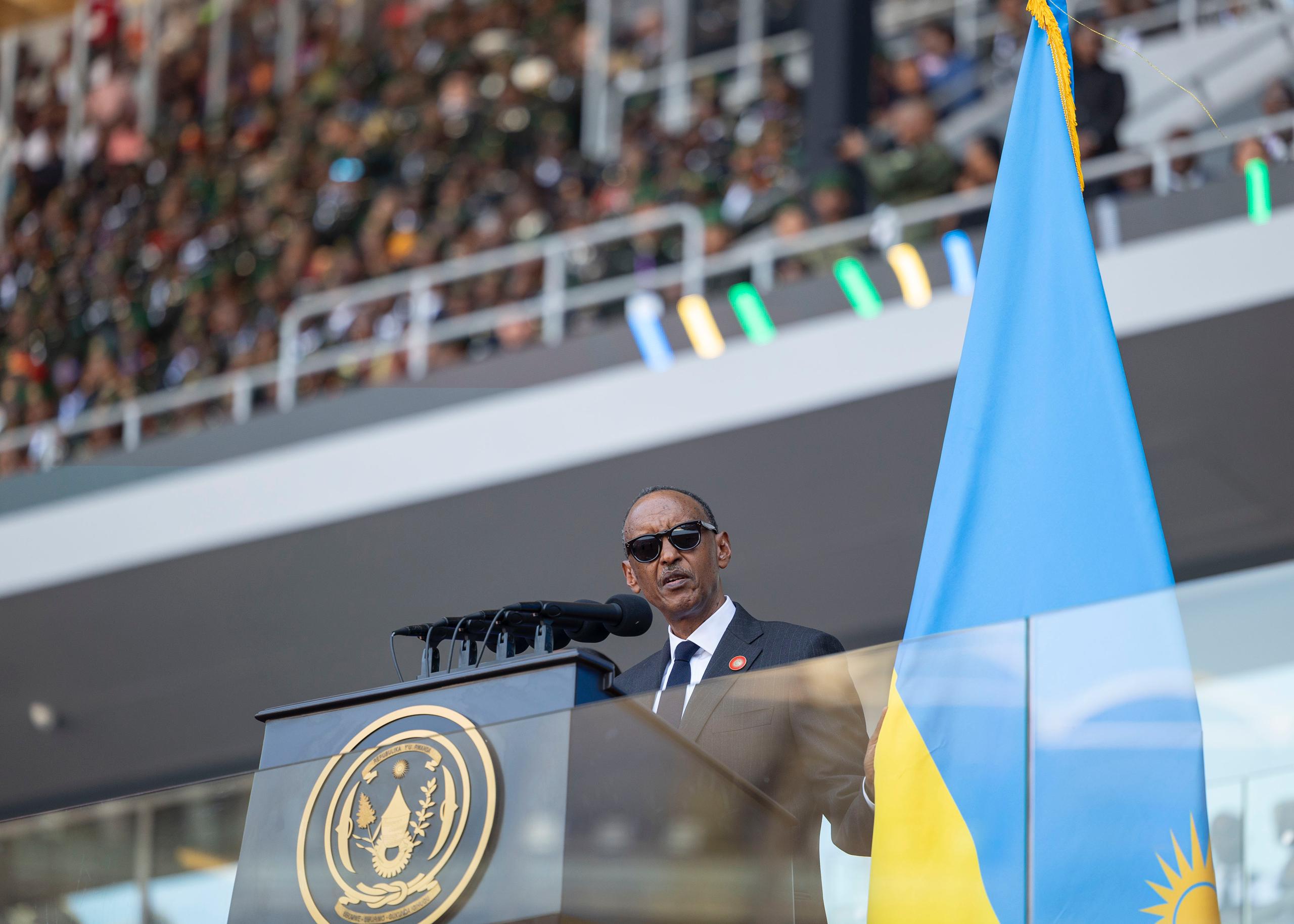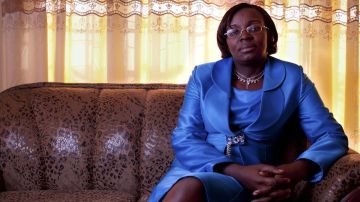Key to note
Rwanda witnessed arguably the worst genocide of modern times when Hutu extremists slaughtered about 800,000 Rwandans, mainly Tutsis, over 100 days in 1994. After the end of the 1994 genocide, when he was chosen as vice president and defence minister, Kagame was only 36 years old. Since then, Kagame has been the de-facto leader of Rwanda. In 2000, he was elected President; since then, he has never lost an election and has remained President.
President Paul Kagame, on Sunday, August 11, emphasised that the prevalence of peace in the region is Rwanda’s priority, noting that it is not a matter of ‘dished-out favours’, but everyone’s obligation.
In his inauguration speech, Kagame said that despite being a priority, peace has been lacking, particularly in eastern DR Congo, emphasizing that it cannot be delivered by anyone from anywhere no matter how powerful if the party most directly concerned does not do what is needed.
The event took place at the 45,000-seat Amahoro Stadium filled to its full capacity with attendees including Rwandans from across the country and leaders from various countries who included 22 Heads of State, four Vice Presidents, two Prime Ministers, one Deputy Prime Minister, two Speakers of Parliament, and five leaders of international and regional organizations.
Kagame thanked Rwandans and guests for their presence, noting that the electoral campaign was a period of joy and satisfaction with millions of Rwandans who voted holding a deeper meaning for the country.
“That reality is undeniable. It stems from the spirit of togetherness among Rwandans and shared determination to be owners of our future. This is exactly what we have been working for all these years. Rather than leaving behind new divisions to be healed, our political process is designed to renew and deepen our unity.”
Over the past three decades, Kagame said, what Rwandans have managed to accomplish is more than what was expected. “Our tragic past ignited a fire in each one of us, the fire of hope, resilience, and justice.”
According to him, the intersecting crises that define the region and world continue to create uncertainty and distrust as a result of unaddressed inequalities and double standards.
“Peace in our region is a priority for Rwanda yet, it has been lacking, particularly in eastern DRC but peace cannot be delivered by anyone from anywhere no matter how powerful if the party most directly concerned does not do what is needed. Without that, the sincere mediation efforts by the mandated regional leaders can not work as intended.”
He thanked the President João Lourenço of Angola and President William Ruto of Kenya, among others, for everything they have done and continue to do in regards to restoring peace in the region.
However, he noted that peace can not happen all on its own, but everyone has to do their part and the right things in order to achieve and sustain peace.
“This should not be seen as a favour to anyone. For anyone to do what is needed and for everybody to have peace and rights, it can’t be a matter of favours being dished out to people, it’s an obligation.”
In the end when it doesn’t happen that’s when people stand and fight for it, he added.
“It should be understood as a necessity because it is a question of people’s rights and there cannot be real peace if those rights are not respected. You can’t wake up one day and decide to deny whoever you want their citizenship right and expect to get away with it.”
Kagame highlighted that there has to be a meeting in the middle and a compromise, pointing out that this is the time to reflect on the kind of world in which the children will live in.
Respect of choices
He said that while everything may not be agreed on, everyone has to respect each other’s choices, doing the best in the unique context.
“There is no longer room for the powerful to impose their vision about how others ought to live or create narratives that falsify the truth. This must always be resisted even when under pressure.”
Kagame noted that there is also no possible excuse for injustice wherever it occurs, whether committed against Africans or inflicted by themselves.
“Indeed, we Africans are people who consistently fought injustice, we don’t need any lessons about how to do so and we must all humbly accept the necessity to adapt our political and governance systems to our specific conditions and expectations of our citizens.”
He noted that the essence is for people to live safe, healthy, and dignified lives.
“From security to health, infrastructure, jobs for youth, we are taking responsibility for our challenges and offering solutions. That is the mindset that brings us together and creates positive change over time for everyone.”
The event featured a military parade by the Rwanda Defence Force (RDF) guard of honour, cultural performances by the national cultural troupe Urukurereza, and musical performances by various local artists.
This term marks the first time Kagame will serve a five-year term, following the 2017 revision of the Rwandan Constitution. Within 15 days of his inauguration, Kagame is expected to appoint the Prime Minister, who will then help in forming the rest of the cabinet within another 15 days.
The New Times Rwanda
Post Views: 1,006
News
Ugandan Citizen Abducted, Held in Secret Detention for Three Months, Sparks Outrage and Calls for Justice

A disturbing new case of unlawful detention has surfaced, highlighting the ongoing human rights crisis in Uganda. A Ugandan citizen was reportedly abducted and held in a secret facility, known as a “safe house,” for three months, only to be released without charge or explanation. This incident, reported by NTV Uganda, has sparked widespread condemnation and renewed calls for accountability regarding human rights abuses in the country.
While the details surrounding the abduction remain unclear, reports indicate that the individual was taken without due process and held incommunicado—an action that has long been condemned by human rights organizations. The victim’s release, with no charges filed and no clear justification, has angered activists and citizens, who view this as yet another case of egregious abuse of power by the state.
“This is a recurring pattern,” said one human rights activist. “Abductions, secret detentions, and unexplained releases have become all too common in Uganda. These acts violate fundamental human rights and erode public trust in the justice system.”
The use of “safe houses,” unregistered detention facilities reportedly operated by security forces, has been a focal point in numerous allegations of torture and illegal imprisonment. Despite repeated calls from both local and international organizations for their closure and accountability for those involved, little action has been taken to address these violations.
This case underscores the urgent need for reform within Uganda’s security apparatus and greater accountability for human rights abuses. Observers hope that drawing attention to these injustices will spur concrete action to bring those responsible to justice and ensure the protection of basic human rights.
As frustration mounts, calls for both domestic and international pressure to hold the government accountable for such crimes grow louder. “One day, there must be accountability for all these crimes against our people,” stated one social media user, reflecting the sentiments of many Ugandans.
News
NUP Gathering Disrupted: Kyagulanyi Alleges Security Force Harassment and Arrests

National Unity Platform (NUP) President Robert Kyagulanyi has accused Ugandan security forces of using excessive force to disrupt a planned NUP gathering. The allegations were detailed in a statement shared on Twitter, following an event held to honor children of NUP supporters who were killed, disappeared, or detained for their political beliefs.
According to Kyagulanyi, security personnel, under the command of an officer identified as Asiimwe, carried out a preemptive operation early in the morning upon learning of the NUP’s plans. The forces allegedly stormed the premises, arrested workers, and deployed tear gas to disperse those present.
“The criminals under the command of one Asiimwe deployed early morning, arrested our workers, and threw tear gas into our premises. They’ve cordoned off the premises and blocked all people from accessing the place,” Kyagulanyi wrote.
Among those reportedly arrested were Saava Peter, Mudenya Samson, and Turyasingura Samson. Kyagulanyi claimed the detained workers were subjected to beatings and interrogated about their political affiliations, with security operatives labeling them as terrorists.
“These JATT operatives asked the workers who they support politically, branding them terrorists and criminals—their only crime being that they work with us. You can imagine the indignity!” Kyagulanyi lamented.
This incident adds to the growing tension in Uganda’s political climate, where opposition parties frequently accuse the government of stifling dissent. Despite the challenges, Kyagulanyi ended his statement with a message of defiance and optimism, proclaiming, “UGANDA WILL BE FREE.”
NUP Gathering Disrupted: Kyagulanyi Alleges Security Force Harassment and Arrests
News
Sudan Demands Apology from Uganda Over Army Chief Muhoozi Kainerugaba’s Threat to Invade Khartoum

Sudan has demanded an official apology from Uganda over “offensive and dangerous” comments made by the chief of Uganda army staff, who threated to invade Khartoum, the Sudan Tribune has reported.
General Muhoozi Kainerugaba, son of Ugandan President Yoweri Museveni and CDF of the Ugandan army, posted two comments on the X platform on Tuesday in which he threatened “to capture Khartoum” with the support of the US President elect Donald Trump after he takes office. The posts were deleted later.
“The government of Sudan demands and official apology from the Ugandan government for the offensive and dangerous comments of the army commander,” Sudan’s foreign ministry said in a statement that the Sudan Tribune said it has seen.
Sudan Demands Apology from Uganda Over Army Chief Muhoozi Kainerugaba’s Threat to Invade Khartoum








